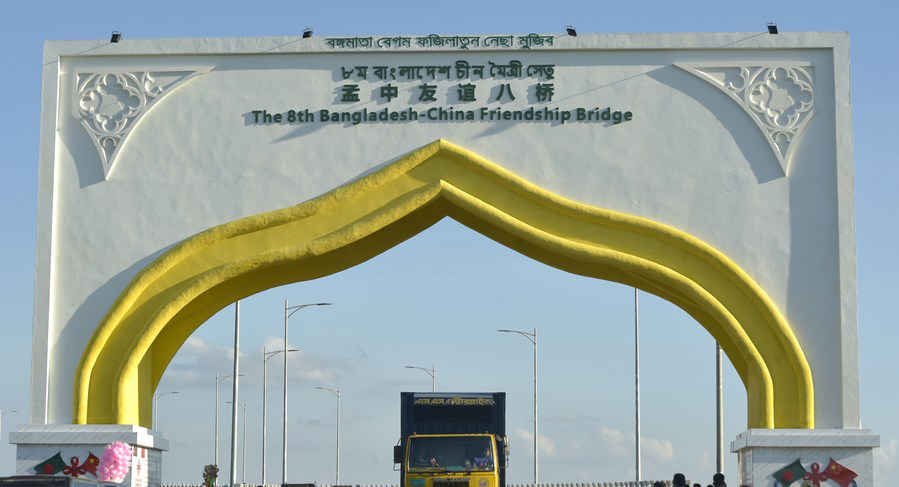
Bangladesh
2023-07-28
In 2022 the Center for Global Asia (CGA) launched the project “The BRI and South Asia” to analyze the impact and connections of the Belt and Road Initiative (BRI) in the South Asian region. Since its launch in 2013, the BRI has received a lot of attention due its engagement in infrastructure development in host countries and for the vast sums it has lent to partner countries. There are also a variety of voices and discourses on the BRI. Much of what has been written has been from outside host countries, and it is these voices that are given prominence even in the international media.
Against this backdrop, the CGA’s the BRI and South Asia project attempts to provide an alternative voice to the existing discourse on BRI-related commentary. It tries to counter this narrative by identifying domestic voices from within host countries. Thus, one of the objectives of this project is to compile information from vernacular sources: human and textual. CGA intends to achieve this objective by compiling database platform containing a detailed bibliography of local literature on the BRI. Interviews and other media are the second component of the database. A third component is the timeline of how various South Asian countries engaged with the BRI project from 2013 to the present. The final component is the collection of relevant archival material from the South Asian countries on their engagement with the BRI project. CGA intends to make the entire database accessible to the public by August 2026.
The bibliographic database includes literature from vernacular sources. This is threefold: literature that authors from host countries have published both locally and internationally; literature that has been published locally, whether academic literature or newspaper articles; and lastly, sources in local languages. This database is an important source of information that can be shared with the international community, as it contains the domestic voices and what people from within the host countries have to say about the Belt and Road Initiative and the various projects that different countries have undertaken. Making literature from vernacular languages accessible in the English language can assist in countering misconceptions and alleviating misinformation about BRI-related projects in South Asia.
CGA has conducted interviews with academics and policymakers on various topics related to a host countries’ engagement with the BRI. This includes Dr. Liaqat Ali Shah, Head of Policy, Centre for Excellence for China-Pakistan Economic Corridor, Pakistan; Mr. Umesh Moramudali, Lecturer at the Department of Economics, University of Colombo; Mr. Thilina Panduwawala, Head of Economic Research at Frontier Research, Sri Lanka; Dr Palitha Kohona, Ambassador of Sri Lanka to China; Admiral (Prof.) Jayanath Colombage, Former Secretary, Ministry of Foreign Affairs, Sri Lanka and incumbent Ambassador of Sri Lanka to the Republic of Indonesia; and Professor Lailufar Yasmin, Professor and Chairperson of the Department of International Relations at the University of Dhaka, Bangladesh. The topics discussed ranged from overviews on a country’s involvement with the BRI to more specific details on particular projects like the China-Pakistan Economic Corridor (CPEC) and the Hambantota Port in Sri Lanka.
These interviews and other media are already available to the public on the CGA’s website under “China and the BRI countries.”
CGA’s the BRI and South Asia database project includes timelines that visually depict the chronology of a single country’s engagement with the BRI. For example, in the case of Sri Lanka, the timeline commences from its membership of the BRI as a founding member in 2013. The timelines also provide details on when a country commenced a certain project with the BRI, the funding received, and the source of that funding.
This archival component of the database provides local material from the first decade of the BRI, i.e. 2013 to 2023. It includes printed material such as posters, brochures and other visual materials on any events and media that were published on the BRI.
Alongside compiling the BRI database, CGA has organized several events related to the Belt and Road Initiative. This includes a closed-door workshop in April 2023. Here we brought together academics from partner universities to create avenues for institutional and individual research collaborations. Another event, “From Silk Road to Superhighway: A Decade of the Belt and Road Initiative,” was a public gathering that reflected on a decade of the BRI. Held on 28th and 29th May 2024, the BRI Conference brought together twenty authors and co-authors who presented their research on four panels titled: “China’s Evolving Strategy on Environmental, Social, and Governance (ESG) Risk Management,” “The BRI and Infrastructure Development,” “Trade and Commercial Interactions,” and “Discourse Dynamics of the Belt and Road Initiative.” Professor David A. Palmer, Professor of Anthropology jointly appointed by the Hong Kong Institute for the Humanities and Social Sciences and the Department of Sociology of the University of Hong Kong, delivered the keynote address entitled “The Religious Factor in the Belt and Road.”
Email: shanghai.cga@nyu.edu
Phone Number: +86 (21) 20595043
WeChat: NYUShanghaiCGA
Address:
Room W822, 567 West Yangsi Road,
Pudong New Area, Shanghai, China

© 2025 All Rights Reserved